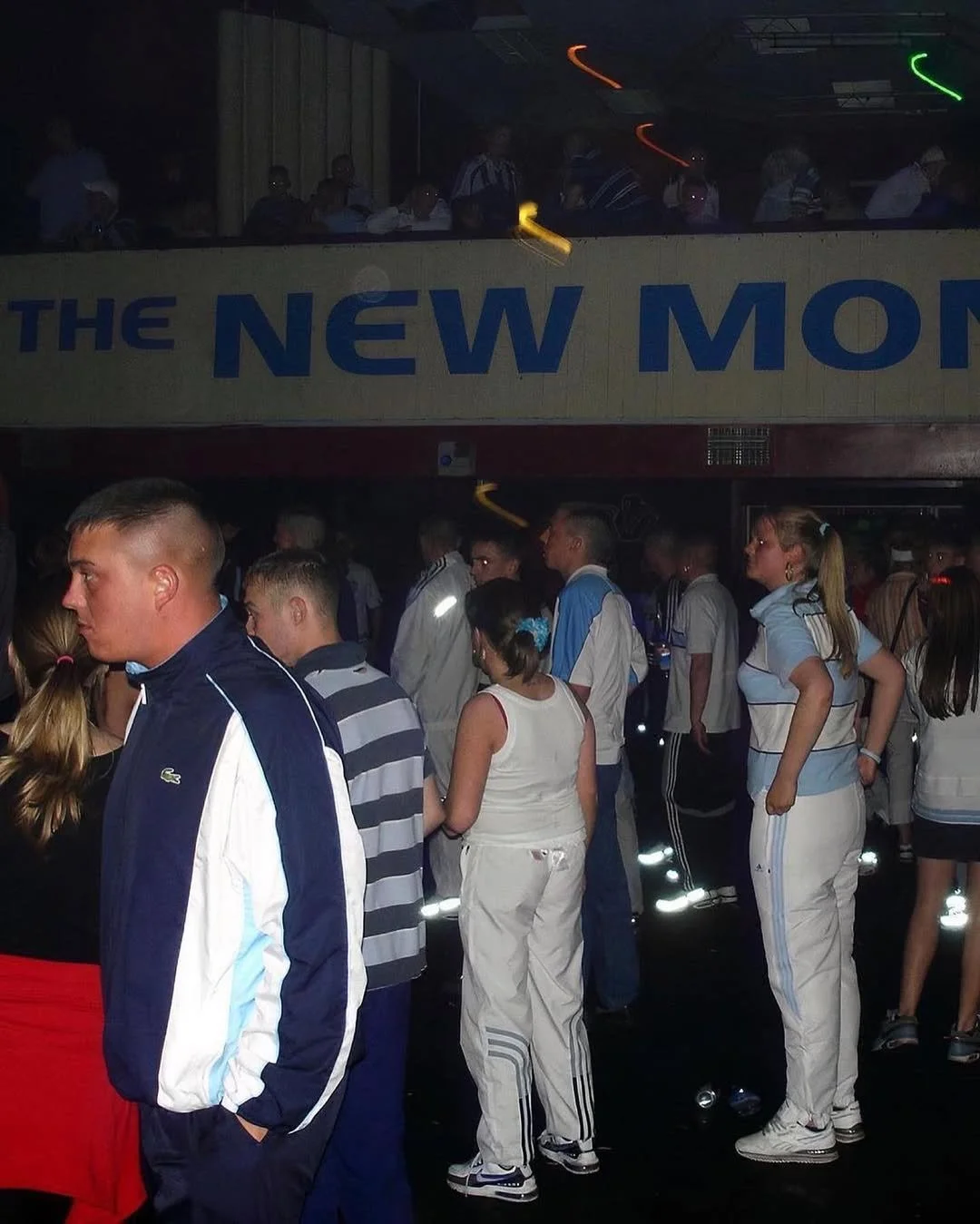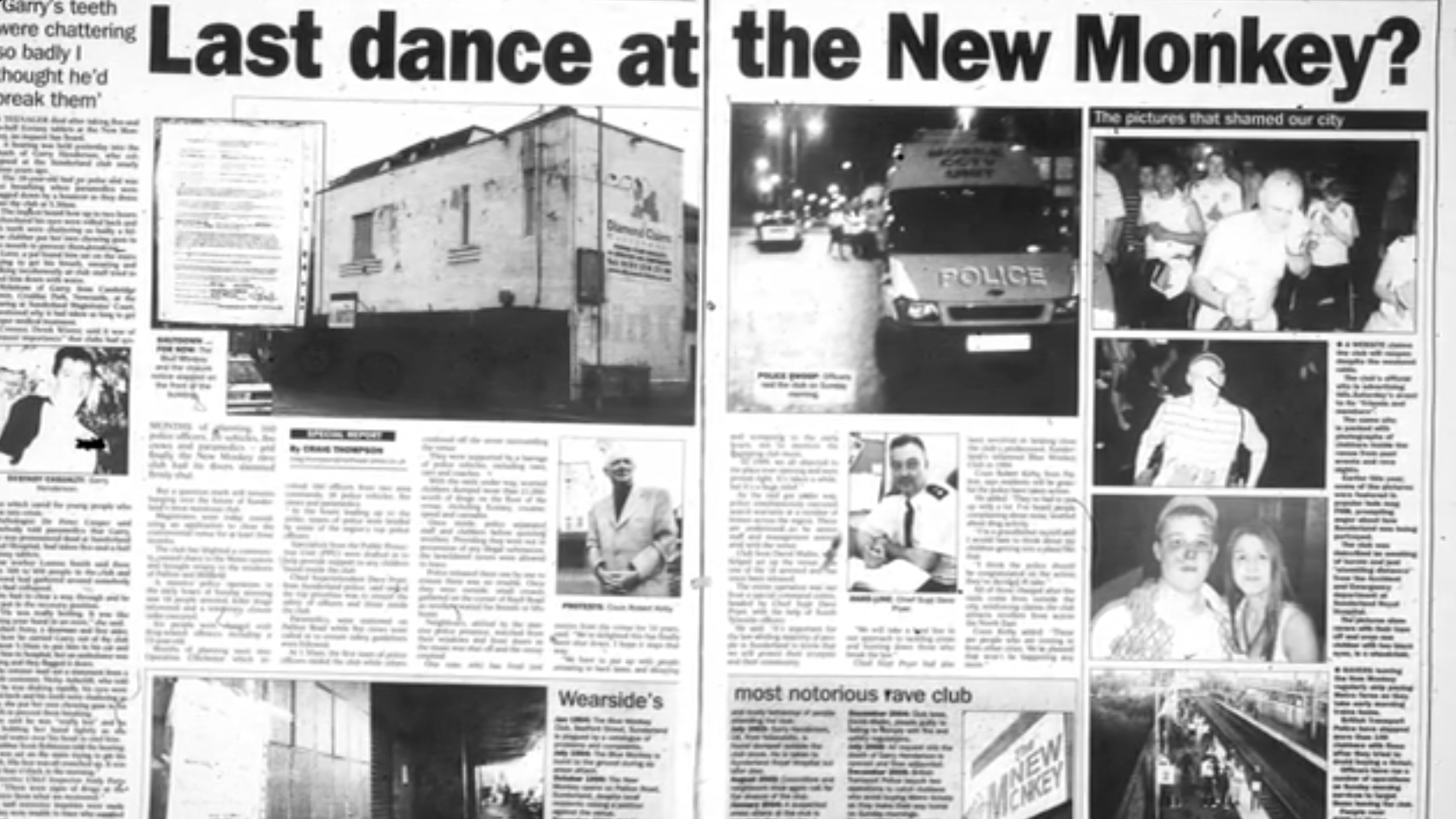The History of Makina
When you land in a new city you might drift through a park, sip a pint in a pub, or people-watch from a café window. That gives you something. A glimpse. A surface-level sense of understanding. But if you want to experience the North East—truly get to know—then there’s one path that cuts straight to the core. Makina.
A music genre built on chesty bass, nitro boosted BPMs and lyrics that will go straight through a pair of untrained ears. A sound that’s outlived trends, outlasted clubs, and outshone every set of turkey teeth in Newcastle. More iconic for the people of the region than the Angel of the North.
But Makina didn’t start here. It began life in Valencia and Barcelona, where it fused the pumping backbone of hard techno with the euphoric highs of trance and Eurodance. In the ‘80s and ‘90s, it ruled dancefloors, fast, furious, and melodic. But like most things in club culture, it faced burnout. By the early 2000s, Makina was fading from Spanish lineups, edged out by minimalism, house, and globalisation. The origins of rave culture were rooted in expression and unity but shifted towards creating a more commercial experience. Global music trends were pushing out local scenes and artists for want of mass appeal events, ultimately aimed at bringing in more cash.
Enter a Tyneside promoter and certified record-digger, DJ Scott. “I found the addresses for labels like Bit Music on the back of the records, jumped on a flight and brought back fuckin’ thousands of them,” he told one interview. That simple move—done out of pure passion, not profit, lit the fuse for something bigger. Scott's stash of imported wax became holy scripture in North East record bags. DJs and producers tapped into a new language. Clubs began to speak it fluently. As the sound moulded to the UK it grew closer to happy hardcore and hardstyle, with sharper drums and sounds than its Spanish counterpart. However, something was still missing from its evolution to bring in the big crowds.
Local legends like MC Stretch and Tazzo were some of the first to give Makina its voice—sometimes frantic, sometimes philosophical, always full of heart. Their bars weren’t brags or violent threats. They were rallying cries. Life-affirming mantras. Lyrics that lifted kids up instead of dragging them into the gutter. That relatability and vulnerability, often missed in rap lyrics, spearheaded the rise in Makina fandom. MC Stretch’s iconic lyrics
“I've got this feeling that's inside ma head, empty space that kinda makes me mad, what to do to fill this space, another time, life, different place.”
have been cemented in the heads of thousands of ravers. Hearing certain lyrics provides comfort in a shared struggle, putting a needed smile on the face of anyone listening.
Where other genres turned to glamour or nihilism, Makina was grounded—its feet planted in the rain-soaked pavements of estates and committed to its values. The genre found its people among the working class. Not polished club-goers with disposable income, but grafters, estate kids, outsiders. The same people who’d later be boxed in by hateful stereotypes: “chavs,” “scallies,” “trouble.” Their uniform—lacoste, polos, trackies, caps—became a symbol of defiance as much as identity. Mainstream clubs reacted by banning tracksuits and trainers, trying to gatekeep culture through the door policy. But Makina found its home elsewhere.
Every scene has its temple. For Makina, it was The New Monkey. Tucked away in a nondescript unit in Sunderland, the New Monkey operated from 1999 to 2006. To outsiders, it looked like a glorified warehouse. To ravers, it was sacred ground. No VIP areas, no dress codes. Just strobes, sweat, and sound. The type of place that stops your mind from wandering out of its walls. But with notoriety came scrutiny. In 2003, 18-year-old Garry Henderson tragically died from an ecstasy overdose inside the venue. The media pounced. Police cracked down. In 2006, a raid involving over 100 officers shut the place down for good. Drugs were seized. Fourteen people were arrested. Among the 300 inside that night were several minors. The headlines wrote their own narrative: danger, lawlessness, crime. But what they missed—what they always miss—is the community behind the chaos, the love behind the noise.
Makina was too fast, too raw, but that’s exactly why it resonates. Now, it’s not just local. In the years following The New Monkey’s closure Makina was building momentum with younger crowds. For those growing up in the area, high deprivation, lack of infrastructure and rising costs of living hope that things will improve feels like a rapidly depleting resource. Makina gave the youth a way to express how much they need and value each other. And so, the spirit of Makina continued to thrive in youth clubs and schools.
Promoters and labels such as Monta Musica and Rewired Records became the reference point for Makina, recognising its fandom in the youth and putting on U18 events to go alongside regular club nights in small local venues. These labels allowed the scene to push on with producers who could revitalise the sound with new tracks. Artists like Assault and TripleXL have become staples of the new wave of Makina. The release of mixtapes on the label encouraged artists to merge together and deepened the unity within the scene. Tracks like K9’s- ‘Nothing you can do’ show the shift towards a less serious instrumental that moves beyond its history and remains as a spark of euphoria.
We spoke to Harry, the promoter for Lively Up, a Newcastle Makina night that has been throwing parties for the past 14 years about the culture surrounding Makina:
“Makina is literally summer. It's happiness - it's high energy - it's a grin from cheek to cheek - it's our folk song - we (the north east) are so proud of this energy and culture we have created, if you ever play any Makina, the ones dancing the most will most certainly be northern. Some people don't get it, it's not for everyone. Some crowds clash with the energy and it doesn't go down well, fights do happen. It varies massively because up north we are fucking mental haha. Down south they don't dance as much or cuddle in the rave as much. But I suppose you can say they are all good humans with hearts of gold. Music is an escapism for many who attend the rave.”
The strength of the bond over Makina is exemplified no better than in the passing of Taylor Bowe, a young life taken from the scene far too early. His memory lives on as friends and MCs wrote lyrics about him to perform during sets. His memorial saw his closest friends perform songs about him, continuing what Taylor loved and honouring him in the way he truly would’ve wanted. The videos broke out across social media touching people far removed from the typically protected Makina scene, showcasing the unity of the scene and the importance of expression within it.
Makina has quietly but steadily spread through platforms like SoundCloud, Facebook, and YouTube. Producers in Glasgow, Poland and Japan are now remixing North Eastern classics or splicing Makina with gabber, trance, and jungle. It’s gone global, without ever selling out on what got it there.
This year, a North Eastern super crew of promoters formed to create the Northern Embassy stage at the final ever Balter, a festival that has firmly stood as a pillar for music that you would gladly describe as a little bit daft. Rave crews Hostilis, NSA and Lively Up have been filling more corners with Makina than offies have with snacks. Previous takeovers include Japanese Makina artist MC Stone, who has been making waves in his own right across Japan, and lately put MC Stretch with DJ Slanty B2B Chemistry to give Balter Festival the close it deserved. An hour that felt like a minute. A set that represented a lifetime. A nod to heritage.
Harry described his feelings towards promoting Makina. “We felt on top of the world selling out shows week in week out because the ravers trusted us and our music choice. Some shows we would sell out with very small, unheard of headliners, but we just caught it right I think. It happens like that. Then it slowly started to get harder and harder. It's (the scene) changed that's for sure but I feel like it's thriving still, just in a different way. The internet b2b COVID definitely switched it up but people's passion and enjoyment for the music lives strong. Saying this, unfortunately the big events are cashing out more than ever leaving the smaller clubs and promoters battering on. It’s growing so fast so hopefully we'll see it on a main stage at Glasto.”
In 2025, Makina lives on. Still loud. Still unfiltered. Still real. You’ll hear it through the tinny speaker of someone’s cracked iPhone, or rattling the windows of a Corsa tearing down the road at 3am. You’ll hear it sampled by a Berlin techno DJ who doesn’t even know where Sunderland is. You’ll hear it in bedrooms, in headphones, in hearts. It doesn’t need approval from the industry. It doesn’t care for the mainstream. It doesn’t ask for your validation. Like grime in London, bassline in Sheffield, or donk in the North West, Makina is owned by the North East. It’s theirs. Even those who mock it secretly know the words. It’s in the air, and you will breathe it in at some point.
It’s Makina. And it’s never left.
Written by Ummer Mayat
Edited by Joe Hurdman
List of Makina tracks to listen to.
NATO Northeast - Running From The Bizzbobs
MC Stretch - I’ve Got This Feeling
David Whistler - Me Muero Por Ti (The Whistlers Remix)
Scott Brown - Why Should You Live
Oakzy B & Tommy D - Not Enough
Nanna Makina & MC Stretch b2b MC Tazo Histeria 13/08/21 @ Digital Newcastle






